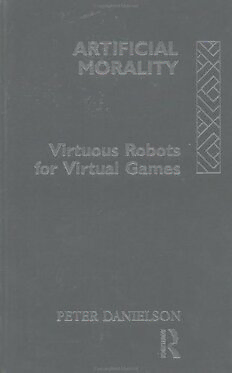
Artificial Morality: Virtuous Robots for Virtual Games PDF
255 Pages·1992·1.272 MB·English
Most books are stored in the elastic cloud where traffic is expensive. For this reason, we have a limit on daily download.
Preview Artificial Morality: Virtuous Robots for Virtual Games
Description:
Artificial Morality shows how to build moral agents that succeed in competition with amoral agents. Peter Danielson's agents deviate from the received theory of rational choice. They are bound by moral principles and communicate their principles to others. The central thesis of the book is that these moral agents are more successful in crucial tests, and therefore rational.Artificial Morality is inspired by artificial intelligence. The solution presented to the problem of rationality and morality is constructive: the building of better moral robots. Danielson uses robots paired in abstract games that model social problems, such as environmental pollution, which reward co-operators but even more those who benefit from others' constraint. It is shown that virtuous, not vicious, robots do better in these virtual games.
See more
The list of books you might like
Most books are stored in the elastic cloud where traffic is expensive. For this reason, we have a limit on daily download.
